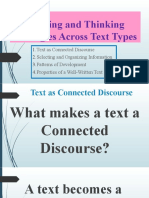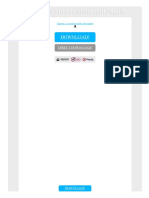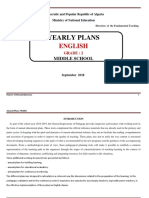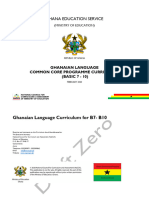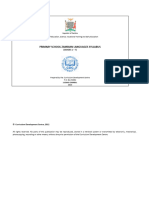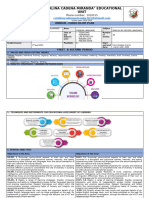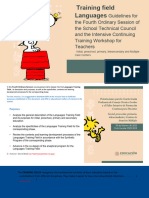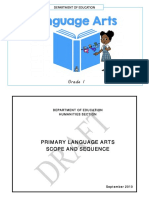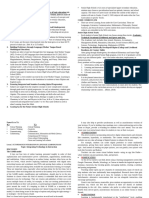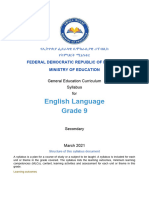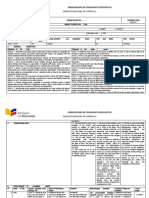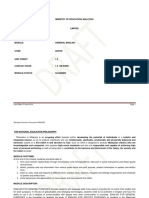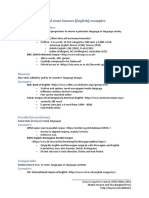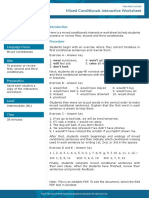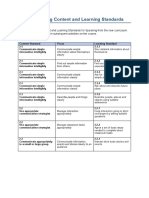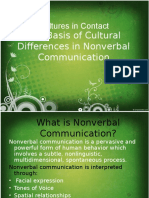MS1 Adapted Plan
MS1 Adapted Plan
Uploaded by
English El MatarCopyright:
Available Formats
MS1 Adapted Plan
MS1 Adapted Plan
Uploaded by
English El MatarOriginal Title
Copyright
Available Formats
Share this document
Did you find this document useful?
Is this content inappropriate?
Copyright:
Available Formats
MS1 Adapted Plan
MS1 Adapted Plan
Uploaded by
English El MatarCopyright:
Available Formats
المخططات السنوية
الجمهورية الجزائرية الديمقراطية الشعبية
وزارة التربية الوطنية
المديرية العامة للتعليم
مديرية التعليم المتوسط
المخططات السنوية
مادة اللغة اإلنجليزية
السنة األول من التعليم المتوسط
سبتمبر 0202
1 وزارة التربية الوطنية
المخططات السنوية
Introduction
The learning plans are essential pedagogical supports meant to organise set and control the process of installing, integrating and
assessing the resources required to construct a set of target competencies for learners in all educational levels. Along this process, these
pedagogical scaffoldings help establish smooth and logical transition between what has been constructed and new constructions. Because
of the aftermath of Covid-19 pandemic, much learning has unfortunately been missed during the third term of the school year 2019-
2020, and the new school comeback (2020-2021) has also been postponed. Accordingly, to bridge this gap and ensure the continuity of
learning in higher levels safely and without any learning constraint, the Ministry of National Education has decided to adapt the current
annual learning plans as an exception for the school year 2020-2021.
2 وزارة التربية الوطنية
المخططات السنوية
Methodological Note
In the present document, the learning objectives and the resources which were not dealt with in the 2019-2020 academic year are included. On the other hand,
certain learning objectives and resources which have been already dealt with or are not really essential to install different competencies have been
exceptionally left out.
The items which were not taught in the previous academic year (2019-2020) are written in bold and underlined in the next level learning plan. They are
integrated in higher levels as learning objectives and resources and not as isolated learning sequences.
The Yearly Learning Plan:
The yearly learning plan is a comprehensive template which contains learning objectives, resources, integration and assessment as well as educational projects
that aims to achieve the global competence of a learning level on the basis of the target competency stated for each domain (oral interaction, interpretation of
oral and written messages and production of oral and written messages) and through an integrated set of learning sections.
Each plan starts from the target competency to achieve ; its development is carried out through a problem-solving situation in its general context that the learner
may encounter in his or her school or social life and a set of partial situations conductive to integration and potential remediation. The plan also contains
instructions from the “support document” and the “teacher’s guide” and the estimated time to devote to the learning section to ensure an adequate
implementation of this latter. In this planning, the pre-requisites are included in order to draw teachers’ attention to the importance of the learners’
background knowledge while preparing lessons and help them regulate their teaching. Teachers are requested to check the level of assimilation of the
pre-requisites regulate their teaching accordingly.
3 وزارة التربية الوطنية
المخططات السنوية
Yearly Learning Plan
Key Stage 1/Level 1
4 وزارة التربية الوطنية
المخططات السنوية
Level: Key stage 1 / MS 1 Time devoted: 2 hours and a half ( 2 hours + 1 hour tutorial session once per 2 weeks)
Middle school Exit profile By the end of the middle school cycle( end of Key Stage 3) , the learner will be able to interact , interpret and produc e
oral and written messages/ texts of average complexity, of a descriptive, narrative , argumentative or prescriptive type, using verbal or non-verbal
supports (written texts, audio and visual aids) and in meaningful situations related to his environment and interests.
Exit Profile: Exit Profile: At the end of level 1 ( 1st year middle school), the learner will be able to interact, interpret and produce short oral and
written messages texts of descriptive type, using written, visual or oral supports, in meaningful situations of communication related to his
environment and interests.
VALUES CROSS-CURRICULAR COMPETENCES
1.Intellectual competency: The learner can :understand and interpret verbal and
National identity: non-verbal messages solve problem situations using a variety of
communication means show creativity when producing oral and written
The learner can use the markers of his identity when messages show some degree of autonomy in all areas of learning.
2.methodological competency : The learner can: work in pairs or in groups use
introducing himself to others: name, nationality , language,
strategies for listening and interpreting oral discoursedevelop effective study methods
religion , flag, national currency ... , mobilize his resources efficiently and manage his time rationally use information
and communication technology whenever he needs it for learning and
National conscience: He can speak about our school days, researchevaluate himself and his peers.
weekend and national public holidays (historic, religious, 3.communicative competency: The learner can: use dramatization and role-play to
communicate appropriatelyuse information and communication technology such as
etc) blogs, websites page, discussion forums , platforms to interact with learners of other
culturesuse dramatization and role-play to communicate appropriatelyuse
Citizenship : He shows respect for the environment and
information and communication technology such as blogs, websites page, discussion
protects it continually forums , platforms to interact with learners of other cultures-process digital data.
4.personal and social competencies :He is aware of his role and others' role in the
Openness to the world : development of projectsHe is keen on promoting the work of his peersHe respects
He is keen on learning about others’ markers of identity our national values and behaves consistentlyHe is honest and accountable for his work
and respects others workHe asserts his personal identity and behaves with self-
confidenceHe socializes through oral or written exchanges He develops attitudes of
solidarity
Domains Oral- Written
In meaningful communicative situations related to his/ her interests, based on written, visual or audio supports, the learner will be able to
interact and produce short and simple descriptive messages/texts orally.
Target In meaningful communicative situations related to his/her environment and interests, based on written, visual or audio supports, the learner
competencies will be able to interpret short and simple descriptive messages/texts orally and in written.
In meaningful communicative situations related to his/her environment and interests, based on written, visual or audio supports, the learner
will be able to produce short and simple written descriptive messages/texts .
5 وزارة التربية الوطنية
المخططات السنوية
Project Learning Planning Learning Estimated
Term Sequence Time
s
Situation1 : Initial PDP lesson(s) (listening &speaking)
Example:
You want to join an international friendship blog . The members of the blog want to know about you. Introduce
yourself to them.
Situation2 :learning PPU /PDP lessons ( language & reading and writing)
Resources
Learning objectives
Lexis Grammar Pronunciation
* Greet people *Lexis related to greeting : *Auxiliary to be and to have
*Introduce myself hi /hello… (present simple tense)
Me and my Friends
/aɪ/
37 H ( both sequences)
*Give information/ *Question words: What? *Personal pronouns /ei /
* Respond to questions /where ? *Possessive adjectives ( to be integrated
about me: my age, my class *Glad/nice *Demonstrative pronoun ‘it’.
1
Weeks11
as a skill)
and my hometown. *Lexis related to colours *Preposition: in/ location (
*Ask about a new friend’s hometown)
name. *Numbers from 1 to 13
Communicative tasks Labelling EmailRole playSongsGamesFill in an ID card
NB: No pre-sequence
Situation3 : Learning to Integrate PPU ( I learn to Integrate) group work
Example:
You are a new member of your school blog , your friends want to know more about you. Introduce yourself to them.
Situation4 : Integration PDP (I Think and Write + self assessment) solo work
Example:
You want to join your school English Language Club. Fill in your ID card then introduce yourself to the club members.
6 وزارة التربية الوطنية
المخططات السنوية
Learning Planning Learning Estimat
Term Projects Sequence ed Time
Situation1 : Initial PDP lesson(s) (listening &speaking)
Example: Jack is your new e-pal on the international friendship blog. He is from England . He wants to know about
your family. Introduce your family to Jack and send him your family tree.
Situation2 :learning PPU /PDP lessons ( language & reading and writing)
Resources
Learning objectives
Lexis Grammar Pronunciation
Give information/respond to * Basic lexis related to *Present simple tense with the verbs:
questions about me : the topic. to live (only affirmative form) / θ/ /δ/
- My age , class, *Numbers from 14 to 100
hometown *Articles a/ an
-Ask and give information *Use of simple sentence pattern
about: ( memorized/ modeled ones:
Me and my Family
My Family Profile
- My family (parents, affirmative and interrogative )
brothers and sisters) *Use of question words ( who ? ,
what ?, where ? )
*Demonstratives : this / that
1 * To be:
- Affirmative/negative forms.
-Yes/No questions only
Pre- requisites Use of question words ( who ? , what ?, where ? )
Communicative tasks Email Role play - Poster Family tree/ Tagging Songs cartoons Family
game Information transfer
Situation3 : Learning to Integrate PPU ( I learn to Integrate) group work
Example:
Your e-pal wants to know more about you and your family . Draw your family tree, add information ( age, job..) and
send it as an attached document.
Situation4 : Integration PDP (I Think and Write + self assessment) solo work
Example:
Pupils from all over the world introduce themselves on an international friendship blog. Post your
information to make new friends .
7 وزارة التربية الوطنية
المخططات السنوية
Project Learning Planning Learning Estimat
Term Sequence ed Time
s
Situation1 : Initial PDP lesson(s) (listening &speaking)
Example: Your e-pal Jack wants to know about your leisure activities . Send him a viber message and tell him about
your leisure activities at weekends.
Situation2 :learning PPU /PDP lessons ( language & reading and writing)
Resources
Learning objectives
Lexis Grammar Pronunciation
Me and my Daily Activities
*Tell the time Lexis related to daily *Discourse markers : today, every… The pronunciation of :
activities , digital time *The present simple tense with /s/ , /z/ ,/ɪz
*Talk about daily
, leisure activities concrete , routine actions
activities *Wh’ questions
*Talk about leisure *Yes / no questions
activities at school *Prepositions of time: in
2 (the morning ); at ( time); on + day weeks12
Question words ( who /what / where …. ? )
Pre- requisites
Communicative tasks - Role play - Games - Email - Songs - Interview
Situation3 : Learning to Integrate PPU ( I learn to Integrate)
Example
You are back to school after the week-end and you want to know about your friend’s leisure activities. Ask your friend
about his week-end leisure activities and write about them.
Situation4 : Integration PDP (I Think and Write + self assessment) solo work
Example: You receive a letter from your e-pal Mark. His mother wants to know about your mother’s daily activities.
Read the letter and write a reply.
8 وزارة التربية الوطنية
المخططات السنوية
Project Learning Planning Learning Estimated
Term Sequence Time
s
Situation1 : Initial PDP lesson(s) (listening &speaking)
Example:
Your friend wants to describe his school . Help him to design the plan and describe it in a short article to support his
project work.
Situation2 :learning PPU /PDP lessons ( language & reading and writing)
Resources
Learning objectives
Lexis Grammar Pronunciation
My School Presentation
Describe my school. *Lexis related to *Prepositions of place. Review of the
Me and my School
Name and locate different school *-Using ‘what’ and ‘where’ with previous sounds
places in my school. ‘to be’ to ask about location.
Ask and answer questions about
locations. 7
2 Pre- requisites To be ( present simple) weeks
‘what’ and ‘where’
Communicative tasks - Labelling - Email ( communicative message) - Role play- Songs- games
Situation3 : Learning to Integrate PPU ( I learn to Integrate)
Example :
Your e-pals are sharing posts about their schools. Post a short description and the plan of your school.
Situation4 : Integration PDP (I Think and Write + self assessment) solo work
Example: Your neighbour is an architect. He wants to make a plan of a school. Design a leaflet to help him. Include a
description and a plan.
9 وزارة التربية الوطنية
المخططات السنوية
Estimated
Project Learning Planning Learning Time
Term Sequence
s
Situation1 : Initial PDP lesson(s) (listening &speaking)
Example: You want to invite your e-pals to visit Algeria. You want them to visit our beautiful country, its monuments
and famous places. Make a leaflet to attract them including our national dish , national currency, famous people and
celebration days
Situation2 :learning PPU /PDP lessons ( language & reading and writing)
Resources
Learning objectives
Lexis Grammar Pronunciation
My country profile/ A Tourist Brochure
Me, my Country and the World
*Ask and give information about : *Lexis related to the -‘to be’ in the present simple / θ/ /δ/
topic with cardinal points
- My country ( currency/
-Using the personal pronoun ‘it’
flag/national and religious days with places.
-The possessive adjectives ‘my/
- Other countries (nationalities/
our’ with places
Flags / currencies/ celebration -Using ‘what’ and ‘where’ with
3 ‘to be’ to ask about location.
days).
( review)
-Prepositions of place. ( review)
Prepositions of place./ θ/ / δ /
Pre- requisites To be
Using ‘what’ and ‘where’ with ‘to be’ to ask about location.
Communicative tasks - Labelling - Email ( communicative message) - Role play- Songs- games
Situation3 : Learning to Integrate PPU ( I learn to Integrate)
Example : This is an e-mail from Kathleen . Read it and help your partner to write a reply to Kathleen.
NB: the e.mail provided to the learners is to be related to the global competence of the sequence
Situation4 : Integration PDP (I Think and Write + self assessment) solo work
Example : You want to invite your friend to visit your beautiful country and its wonderful places and monuments.
Make a leaflet to attract tourists from all over the world ( include national dish, national currency, famous people,
national and religious celebration days, languages….)
11 وزارة التربية الوطنية
You might also like
- English Plus 4 Tests PDFDocument130 pagesEnglish Plus 4 Tests PDFAlejandro Raffo77% (56)
- Teaching English in The Elementary Grades (Language Arts) Your GoalsDocument16 pagesTeaching English in The Elementary Grades (Language Arts) Your Goalsjade tagab100% (5)
- Indigenous Languages Junior - Infant To JuniorDocument31 pagesIndigenous Languages Junior - Infant To JuniorRutendo Christashel GwekwerereNo ratings yet
- Zambia Primary School English SyllabusDocument35 pagesZambia Primary School English Syllabusalpha67% (3)
- Vision: Ramon Magsaysay Technological UniversityDocument8 pagesVision: Ramon Magsaysay Technological UniversityDaryll Jim Angel100% (1)
- Reading and Thinking Strategies Across Text TypesDocument16 pagesReading and Thinking Strategies Across Text TypesJane Sagutaon50% (2)
- Express 1a Students Book PDF EnglishDocument2 pagesExpress 1a Students Book PDF EnglishLcsNo ratings yet
- MS2 New Yearly Plan 2020 PDFDocument9 pagesMS2 New Yearly Plan 2020 PDFSiham SissiNo ratings yet
- 1 AM AnglDocument15 pages1 AM AnglAmiroucheNo ratings yet
- 4am PDFDocument24 pages4am PDFHadjer BelkadiNo ratings yet
- 2 AM AnglDocument14 pages2 AM Anglmahboubi chamseddineNo ratings yet
- 2 Am ProgrameDocument17 pages2 Am ProgrameRezig FatmaNo ratings yet
- Ghanaian Language CCP Curriculum B7 B10 Draft ZeroDocument86 pagesGhanaian Language CCP Curriculum B7 B10 Draft Zeromujahidhussein617No ratings yet
- Zambian Languages 1 7 November 2012Document67 pagesZambian Languages 1 7 November 2012lilianmudendaNo ratings yet
- Planificacion de 1bgu AnnualDocument15 pagesPlanificacion de 1bgu AnnualJohanna Angelica Jara AlvaradoNo ratings yet
- EL 116 ReviewerDocument12 pagesEL 116 ReviewerJulie Rivera Sanguyo BognotNo ratings yet
- Ges New Jhs Syllabus English CCP Curriculum For b7 10 Zero DraftDocument124 pagesGes New Jhs Syllabus English CCP Curriculum For b7 10 Zero DraftBenjamin MacFinnNo ratings yet
- Dli Coordinator Entry PlanDocument24 pagesDli Coordinator Entry Planapi-589645770No ratings yet
- Fourth CTE Session - Languages Training FieldDocument34 pagesFourth CTE Session - Languages Training FieldScribdTranslationsNo ratings yet
- Grade 1 Language Arts Scope and SequenceDocument44 pagesGrade 1 Language Arts Scope and SequenceSamantha Wilson0% (1)
- TTL2-PRELIMDocument8 pagesTTL2-PRELIMJay Ann GacusanNo ratings yet
- Information Sheet 12 EDUC 115Document4 pagesInformation Sheet 12 EDUC 115Genesis Agustin TablizoNo ratings yet
- Aims and Principles of Foreign Language TeachingDocument3 pagesAims and Principles of Foreign Language TeachingresearchparksNo ratings yet
- 0.2(a) L1 SyllabusDocument52 pages0.2(a) L1 SyllabusSheila ThompsonNo ratings yet
- Syllabus For English LI - Secondary Cycle: Ref: 2016-11-D-2-En-5 Orig.: ENDocument63 pagesSyllabus For English LI - Secondary Cycle: Ref: 2016-11-D-2-En-5 Orig.: ENEmen MenjliNo ratings yet
- Virtual English 3-4 - Program 2410Document9 pagesVirtual English 3-4 - Program 2410Aluna ZapataNo ratings yet
- Eng01 Sy 21 22Document26 pagesEng01 Sy 21 22RFSNo ratings yet
- Eng L1Document55 pagesEng L1JamesNo ratings yet
- 4to Sílabo D Inglés TI 2019-20Document21 pages4to Sílabo D Inglés TI 2019-20Marvin QuimisNo ratings yet
- 06 Syllabus English G9 (02 10 2021)Document53 pages06 Syllabus English G9 (02 10 2021)abdimoh7522No ratings yet
- General Shaping Paper of The Matatag CurriculumDocument7 pagesGeneral Shaping Paper of The Matatag CurriculumJena VillanuevaNo ratings yet
- FrenchDocument242 pagesFrenchCastro Osei WusuNo ratings yet
- Ministry of Education, Science, Vocational Training and Early Education Curriculum Development CentreDocument49 pagesMinistry of Education, Science, Vocational Training and Early Education Curriculum Development CentreTahpehs PhiriNo ratings yet
- AbinitiosillabusDocument2 pagesAbinitiosillabusapi-368047655No ratings yet
- Flexi Syllabus GEC 1 FOR APPROVAL PDFDocument14 pagesFlexi Syllabus GEC 1 FOR APPROVAL PDFJamaica TinguhaNo ratings yet
- Purposive Communication Eli Denneil DC BuscarDocument15 pagesPurposive Communication Eli Denneil DC Buscargervisrael.gonzales.twphosiNo ratings yet
- Teacher Education: Your College/C Ampus Logo HereDocument8 pagesTeacher Education: Your College/C Ampus Logo HereRichard Bañez100% (1)
- Module 1: 6 Hrs. Course Instructor Contact Details Cynthia Sugon Dy C.dy@usls - Edu.ph 09997619012 Consultation Hours 10:30-12:00pmDocument4 pagesModule 1: 6 Hrs. Course Instructor Contact Details Cynthia Sugon Dy C.dy@usls - Edu.ph 09997619012 Consultation Hours 10:30-12:00pmTRICIA YOUNGNo ratings yet
- Macro Skills Competencies in Teaching English in K To 12 CurriculumDocument18 pagesMacro Skills Competencies in Teaching English in K To 12 Curriculummilitanteaiza14No ratings yet
- Social ShsDocument129 pagesSocial ShsMonica AyamdooNo ratings yet
- 06 Syllabus English G12 (02 10 2021)Document71 pages06 Syllabus English G12 (02 10 2021)abdimoh7522No ratings yet
- Course Syllabus in Purposive CommunicationDocument14 pagesCourse Syllabus in Purposive CommunicationMarkAnthonyLopezNo ratings yet
- Course Overview 1Document10 pagesCourse Overview 1Chia-Lin ChuangNo ratings yet
- Module 1 Lesson 1 and 2Document34 pagesModule 1 Lesson 1 and 2FUENTES ANDREANo ratings yet
- Lesson 3 K To 12 Curriculum FrameworkDocument3 pagesLesson 3 K To 12 Curriculum Frameworksaliendres.elyseNo ratings yet
- Myp-Brief Language-Acquisition 2015Document2 pagesMyp-Brief Language-Acquisition 2015api-291276192No ratings yet
- #2 Canale and SwainDocument5 pages#2 Canale and SwainKRISTELLE COMBATERNo ratings yet
- Unidad Educativa Fiscal " Honorato Vasquez": Annual Curriculum PlanDocument6 pagesUnidad Educativa Fiscal " Honorato Vasquez": Annual Curriculum PlanAndrea Prissilla Camacho AndradeNo ratings yet
- 11A BEEd Curriculum ProposalDocument46 pages11A BEEd Curriculum ProposalchristianlyletorresNo ratings yet
- Kids Zone 4Document26 pagesKids Zone 4Ana Maria MaldonadoNo ratings yet
- Department of Teacher Education EDTLE 1-Course Syllabus: EDTLE 1: Home Economics andDocument9 pagesDepartment of Teacher Education EDTLE 1-Course Syllabus: EDTLE 1: Home Economics andYheng Sisbreño LancianNo ratings yet
- Matatagcurriculum 240129100755 47211f07Document96 pagesMatatagcurriculum 240129100755 47211f07Teacher MaedelNo ratings yet
- EE 101 Teaching English in The Elementary Grades Language ArtsDocument26 pagesEE 101 Teaching English in The Elementary Grades Language ArtsAlexis Almadrones100% (1)
- Module in Ed 206. Part IdocxDocument9 pagesModule in Ed 206. Part IdocxNicole Anne Sajonia DolomNo ratings yet
- Lesson 6Document3 pagesLesson 6Lynou ZacalNo ratings yet
- KSKV Bi Sem 1Document11 pagesKSKV Bi Sem 1iffamiera0% (1)
- MTB - MLE Curriculum FrameworkDocument29 pagesMTB - MLE Curriculum Frameworkrenair ravaloNo ratings yet
- Course OverviewDocument20 pagesCourse OverviewChia-Lin ChuangNo ratings yet
- 2016-11-D-2-en-4Document60 pages2016-11-D-2-en-4Sheila ThompsonNo ratings yet
- EDUC 101 - Course Syllabus: Department of Teacher EducationDocument14 pagesEDUC 101 - Course Syllabus: Department of Teacher EducationKyla DamaliNo ratings yet
- Empowering Multilingual Learners: Strategies for Inclusive EdcuationFrom EverandEmpowering Multilingual Learners: Strategies for Inclusive EdcuationNo ratings yet
- Giving Oral Instructions To EFL Young Le PDFDocument10 pagesGiving Oral Instructions To EFL Young Le PDFEnglish El MatarNo ratings yet
- Valentino Rossi Video Script - Spoken Errors (WBK5 Task 4)Document1 pageValentino Rossi Video Script - Spoken Errors (WBK5 Task 4)English El MatarNo ratings yet
- Part 1 - The Observation Instrument: Coursework Portfolio Alistair MelvinDocument47 pagesPart 1 - The Observation Instrument: Coursework Portfolio Alistair MelvinEnglish El MatarNo ratings yet
- 3ms - Sequence One and Two - by Teacher Djamel Djamel 2018 2019 PDFDocument47 pages3ms - Sequence One and Two - by Teacher Djamel Djamel 2018 2019 PDFEnglish El Matar50% (2)
- Exploring The Practices of Giving Instructions in English Classroom at Primary LevelDocument13 pagesExploring The Practices of Giving Instructions in English Classroom at Primary LevelEnglish El MatarNo ratings yet
- My 3 MS English Course Book 2nd GenerationDocument158 pagesMy 3 MS English Course Book 2nd GenerationEnglish El MatarNo ratings yet
- 3ms - Sequence One and Two - by Teacher Djamel Djamel 2018 2019 PDFDocument47 pages3ms - Sequence One and Two - by Teacher Djamel Djamel 2018 2019 PDFEnglish El Matar50% (2)
- Linguistic Imperialism: The English Language As A Trojan HorseDocument2 pagesLinguistic Imperialism: The English Language As A Trojan HorseFreddy Benjamin Sepulveda TapiaNo ratings yet
- Kertas 1: Skema Peperiksaan Percubaan Bahasa Inggeris PMR Selaras Tahun 2012 Negeri PerakDocument4 pagesKertas 1: Skema Peperiksaan Percubaan Bahasa Inggeris PMR Selaras Tahun 2012 Negeri Perakcmfoo2988No ratings yet
- Thesis UpdatedDocument55 pagesThesis UpdatedCharles MarananNo ratings yet
- 9m.2-L.6@by The Railway Side & Prosodic Features of SpeechDocument3 pages9m.2-L.6@by The Railway Side & Prosodic Features of SpeechMaria Buizon0% (1)
- ENG201 SOLVED MCQs For PAPERS AND QUIZS PDFDocument78 pagesENG201 SOLVED MCQs For PAPERS AND QUIZS PDFvu MITNo ratings yet
- Speech Choir OralDocument2 pagesSpeech Choir OralAlbert Aribal BalanzaNo ratings yet
- Types of Corpora and Some Famous (English) Examples: Balanced, RepresentativeDocument2 pagesTypes of Corpora and Some Famous (English) Examples: Balanced, RepresentativeVenz Lacre100% (1)
- Amara Zulfa Claudia Izzak - Final Test - Drama Analysis 305 - Actantial ModelDocument3 pagesAmara Zulfa Claudia Izzak - Final Test - Drama Analysis 305 - Actantial ModelAmara ZulfaNo ratings yet
- Hortatory Text TugasDocument3 pagesHortatory Text TugasAnnie DavisNo ratings yet
- Tagalog Structures Word 2003 FormatDocument40 pagesTagalog Structures Word 2003 Formatapi-3732946100% (1)
- Mixed Conditionals Interactive Worksheet Teachers NotesDocument1 pageMixed Conditionals Interactive Worksheet Teachers Noteslizeth natalia bernal gambaNo ratings yet
- Paper & Task Score Tutor Comment P1 Task 3: The Distance Delta Exam Practice Report Unit 4 Name Kateryna KirichenkoDocument4 pagesPaper & Task Score Tutor Comment P1 Task 3: The Distance Delta Exam Practice Report Unit 4 Name Kateryna KirichenkoEmily JamesNo ratings yet
- Unit 6 Grammar-Sentence TypesDocument8 pagesUnit 6 Grammar-Sentence TypesSiawHiong940% (1)
- Nouns: Institut Pendidikan Guru Kampus Ipoh 31150 Hulu Kinta Perak Darul RidzuanDocument17 pagesNouns: Institut Pendidikan Guru Kampus Ipoh 31150 Hulu Kinta Perak Darul Ridzuanaqajim91No ratings yet
- Master Sanskrit Easily 3of3Document55 pagesMaster Sanskrit Easily 3of3jai100% (3)
- Lailahs Lunchbox Lesson ZoomDocument6 pagesLailahs Lunchbox Lesson Zoomapi-369325039No ratings yet
- English Word Form Japanese Japanese Phonetic: Page 1 of 26Document26 pagesEnglish Word Form Japanese Japanese Phonetic: Page 1 of 26almira garciaNo ratings yet
- Year 5 Speaking Content and Learning StandardsDocument1 pageYear 5 Speaking Content and Learning StandardsJo Quen ElipNo ratings yet
- AMT EnglishDocument2 pagesAMT EnglishZorah BarreraNo ratings yet
- Sentences With Multiple ClausesDocument11 pagesSentences With Multiple ClausesMusyahidi AinulYaqinNo ratings yet
- Rubric For Chapter SummaryDocument2 pagesRubric For Chapter SummaryLuna Ledezma100% (1)
- B.Tech 1st Sem Curriculum:EnglishDocument38 pagesB.Tech 1st Sem Curriculum:EnglishTechno India Group0% (1)
- Lesson Plan Template (Moe Template) Subject Year/Form Duration Theme Topic Focus Skills: L/S/R/W/La/Lia Content StandardDocument2 pagesLesson Plan Template (Moe Template) Subject Year/Form Duration Theme Topic Focus Skills: L/S/R/W/La/Lia Content StandardMalania MaturinNo ratings yet
- Cultures in Contact: The Basis of Cultural Differences in Nonverbal CommunicationDocument22 pagesCultures in Contact: The Basis of Cultural Differences in Nonverbal CommunicationDũng Trần ViệtNo ratings yet
- Topic 4 Business Writing (I)Document59 pagesTopic 4 Business Writing (I)roomNo ratings yet
- The Development of EspDocument5 pagesThe Development of EspSekar PentaNo ratings yet
- Module 1 - The Nature and Process of Communication, Models of Communication, StrategiesDocument25 pagesModule 1 - The Nature and Process of Communication, Models of Communication, StrategiesKristine Ritchel Torres100% (7)





